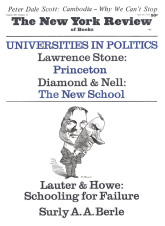In response to:
Deus le Volt? from the May 21, 1970 issue
To the Editors:
Geoffrey Barraclough is not only one of the more skilled historians of our time but also one of the more profound and influential. It is with some hesitation, therefore, that one considers to venture a criticism of his deep insights in human events. However, in his recent review-article (NYR, May 21), Barraclough chose to uphold and then elaborate upon a so-called “Nordic element” to explain the explosive martial spirit underlying the crusading movement, which, furthermore, he accepts as the antecedent of Modern European colonialism.
Such a thesis strikes me as much too facile and requires at least a minor challenge, if only to elicit further explanation from Professor Barraclough.
To begin with, the history of the church militant certainly does not start with the Crusades. While the term “holy war” may not have been employed before, the phenomenon of a total Christian military expedition dates back at least to the alliance between Pope and Emperor during the Carolingian wars against the Saxons in the late eighth century: cross and sword were exquisitely harmonized to kill, to conquer, and to exterminate if conversion failed. Nor should one stop with Charlemagne (who, for purposes of argument, might be dubbed a “northerner”), but go back to Emperor Justinian whose Italian war in the middle of the sixth century was not only an effort to reconstitute Imperial power throughout the Mediterranean but a determined and brutal crusade against the Ostrogoths who had accepted Arian Christianity. Yet even he cannot be called the Father of Militant Christianity: this dubious honor must go to Justinian’s hero, his predecessor Emperor Constantine, who, two hundred years earlier, dedicated himself to the service of the cross-sword, a composite vision which led him to erect a state in which Christianity became identical with citizenship. In so doing, Constantine elevated the first-century exhortations of St. Paul into official state policy. Henceforth, the armies of Christ would march across the face of the earth.
In the light of this tradition, a claim that the Crusades were a product of the barbarism imported into the Mediterranean world by Norman knights and German barons is less convincing. Christianity while in the hands of “southerners” was just as bellicose. The wrath of the Crusaders cannot easily be ascribed to Norsemen and their latent pagan instincts. One can hardly compare the hysterical conduct of the Christian wars to the battles initiated by the Scandinavian Vikings as they penetrated the river valleys of Europe. Despite some legendary recollections of the violence of the Vikings, they do not compare to the Hunnic horrors perpetrated by the Christian hordes on Moslems and Christians alike. The invasion of England by William the Conqueror, a Christian Viking, was far more traumatic than the earlier incursions of Britain by pagan Vikings. Similarly, in Russia, the pre-Christian Viking princely elite fought to unite divided Slavic tribes and fuse them with Finnish neighbors, while their converted successors, beginning with Princess Olga, showed a far greater penchant for slaughter. Clearly, the stimulant to ferocity was not Thor or Wodon, but Jesus the Christ in whose name atrocities had been committed for centuries already.
The responsibility for the inhumanity of the Crusades must be borne by Christianity itself. Though it had its enlightened exponents, the majority of its spokesmen were militants, men whose attitudes had roots in pagan Rome (if cultural antecedents must be found as Barraclough insists). The Christianity that prevailed was a cult molded in the cultural crucible of the late Roman Empire and from which it received all the warlike and aggressive ingredients found in the Crusades. The papal hierarchy ruled as had done its Roman predecessor, the Imperial civil service. Just as the latter had frowned upon timidity and withdrawal from public service while lauding the virile virtues of the warrior, so did the leadership of the Roman Christian Church discourage the holy passivism of the original Christian martyrs and call for a holy activism which, in the crusading era, reached fever-pitched proportions. Christendom had no need of spurious Nordic stimuli; it was already amply endowed with its own streak of fanaticism….
Henry R. Huttenbach
Department of History
City College
City University of New York
This Issue
June 18, 1970



